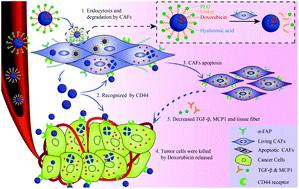Our official English website, www.x-mol.net, welcomes your
feedback! (Note: you will need to create a separate account there.)
Fibroblast activation protein-α-adaptive micelles deliver anti-cancer drugs and reprogram stroma fibrosis
Nanoscale ( IF 5.8 ) Pub Date : 2020-11-11 , DOI: 10.1039/d0nr04465b Chao Teng 1, 2, 3, 4 , Beiyuan Zhang 1, 2, 3, 4 , Zhongyue Yuan 1, 2, 3, 4 , Zheng Kuang 1, 2, 3, 4 , Zhuodong Chai 1, 2, 3, 4 , Lianjie Ren 1, 2, 3, 4, 5 , Chao Qin 1, 2, 3, 4 , Lei Yang 1, 2, 3, 4 , Xiaopeng Han 1, 2, 3, 4 , Lifang Yin 1, 2, 3, 4
Nanoscale ( IF 5.8 ) Pub Date : 2020-11-11 , DOI: 10.1039/d0nr04465b Chao Teng 1, 2, 3, 4 , Beiyuan Zhang 1, 2, 3, 4 , Zhongyue Yuan 1, 2, 3, 4 , Zheng Kuang 1, 2, 3, 4 , Zhuodong Chai 1, 2, 3, 4 , Lianjie Ren 1, 2, 3, 4, 5 , Chao Qin 1, 2, 3, 4 , Lei Yang 1, 2, 3, 4 , Xiaopeng Han 1, 2, 3, 4 , Lifang Yin 1, 2, 3, 4
Affiliation

|
Cancer-associated fibroblasts (CAFs) are the majority cell population of tumor stroma, and they not only play important roles in tumor growth and metastasis, but they also form a protective physical barrier for cancer cells. Herein, we designed a fibroblast activation protein-α (FAP-α)-adaptive polymeric micelle based on hyaluronic acid and curcumin conjugates. The polymeric micelle is composed of a CD44-targeting shell and a FAP-α-cleavable polyethylene glycol (PEG) coating. When FAP-α is encountered on the surface of CAFs in the tumor microenvironment, the PEG layer is released, hyaluronic acid is recovered on the surface of nanoparticles, and the nanoparticles effectively inhibit the growth of tumor cells and CAFs through CD44-mediated endocytosis. The FAP-α-adaptive polymeric micelle exhibited potent anti-cancer efficacy by enhancing CAF apoptosis and reducing collagen in tumor tissues. Collectively, FAP-α-adaptive nanoparticles may be a promising method for antitumor anticancer treatments via reprogramming of stroma fibrosis.
中文翻译:

适应成纤维细胞活化蛋白-α的胶束提供抗癌药物并重编程基质纤维化
癌症相关的成纤维细胞(CAF)是肿瘤基质的主要细胞群,它们不仅在肿瘤的生长和转移中起重要作用,而且还形成了癌细胞的保护性物理屏障。在这里,我们设计了一种基于透明质酸和姜黄素结合物的成纤维细胞活化蛋白-α(FAP-α)自适应高分子胶束。聚合胶束由靶向CD44的壳和FAP-α可裂解的聚乙二醇(PEG)涂层组成。当在肿瘤微环境中CAF的表面遇到FAP-α时,PEG层被释放,透明质酸在纳米颗粒的表面被回收,纳米颗粒通过CD44介导的内吞作用有效地抑制了肿瘤细胞和CAF的生长。FAP-α适应性高分子胶束通过增强CAF凋亡并减少肿瘤组织中的胶原蛋白表现出有效的抗癌功效。总的来说,适应FAP-α的纳米颗粒可能是抗肿瘤抗癌治疗的有前途的方法通过重编程基质纤维化。
更新日期:2020-11-25
中文翻译:

适应成纤维细胞活化蛋白-α的胶束提供抗癌药物并重编程基质纤维化
癌症相关的成纤维细胞(CAF)是肿瘤基质的主要细胞群,它们不仅在肿瘤的生长和转移中起重要作用,而且还形成了癌细胞的保护性物理屏障。在这里,我们设计了一种基于透明质酸和姜黄素结合物的成纤维细胞活化蛋白-α(FAP-α)自适应高分子胶束。聚合胶束由靶向CD44的壳和FAP-α可裂解的聚乙二醇(PEG)涂层组成。当在肿瘤微环境中CAF的表面遇到FAP-α时,PEG层被释放,透明质酸在纳米颗粒的表面被回收,纳米颗粒通过CD44介导的内吞作用有效地抑制了肿瘤细胞和CAF的生长。FAP-α适应性高分子胶束通过增强CAF凋亡并减少肿瘤组织中的胶原蛋白表现出有效的抗癌功效。总的来说,适应FAP-α的纳米颗粒可能是抗肿瘤抗癌治疗的有前途的方法通过重编程基质纤维化。











































 京公网安备 11010802027423号
京公网安备 11010802027423号